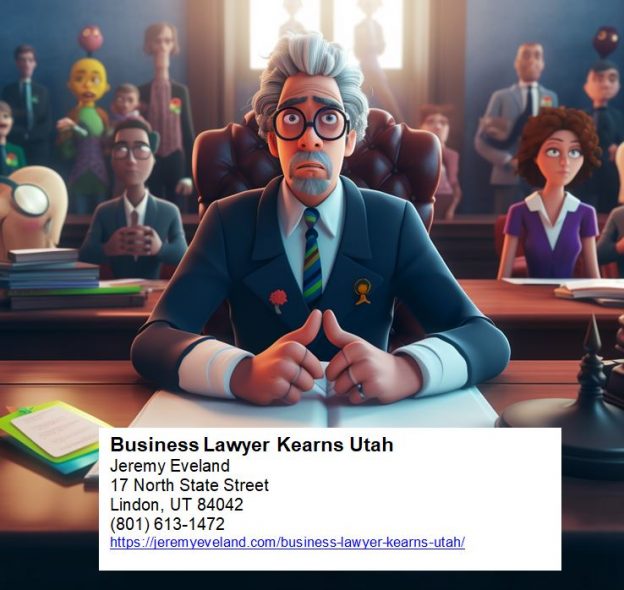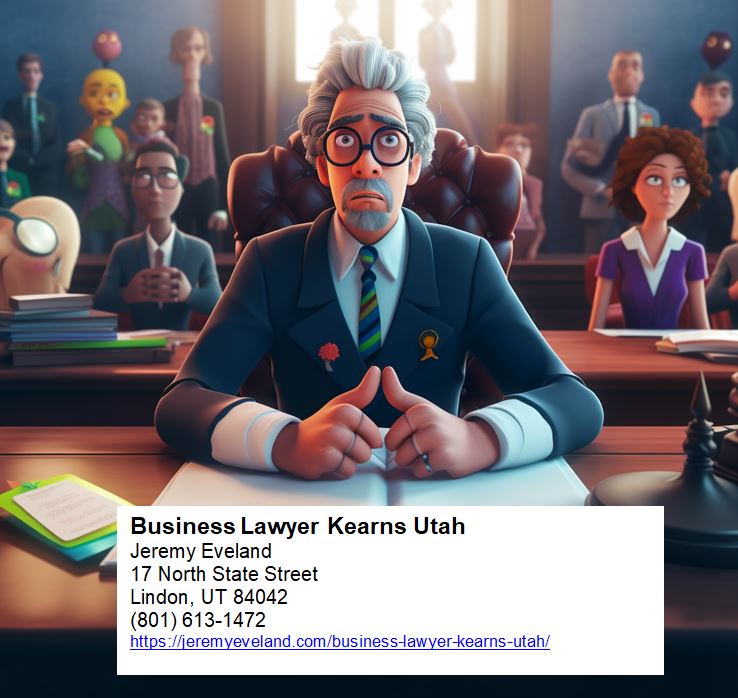Business Lawyer Centerville Utah
Are you a business owner in Centerville, Utah? Do you find yourself navigating the complex world of business regulations and legal disputes? Look no further – a business lawyer in Centerville, Utah is here to help. With their expertise and knowledge of local laws, they can guide you through the legal maze and ensure that your company remains compliant. Whether you need assistance with contract drafting, intellectual property protection, or resolving a legal dispute, a business lawyer is an invaluable resource for your company. They understand the unique challenges faced by businesses in Centerville and are dedicated to providing top-notch legal services tailored to your specific needs. So why wait? Take the first step towards safeguarding your business's success by partnering with a skilled business lawyer in Centerville, Utah today.
Key Takeaways
- A business lawyer in Centerville, Utah is crucial for protecting a company's interests throughout the legal process.
- They have deep understanding of state and federal business law and can provide tailored advice to guide businesses through complex laws and regulations.
- Business lawyers are essential in resolving employment law disputes, such as wrongful termination claims, wage disputes, and discrimination allegations, while minimizing risks for the company.
- They play a vital role in negotiations and settlements, ensuring fair and favorable agreements that consider long-term implications and support business growth.
Understanding the Legal Needs of Businesses
You need to understand the legal needs of your business in order to protect it from potential risks and ensure its long-term success. As a business owner, it is essential to have a clear understanding of the legal framework within which your company operates. This includes being aware of the laws and regulations that govern your industry, as well as any specific legal requirements that pertain to your particular business.
A business lawyer in Centerville, Utah can assist you in navigating these complex legal waters. They have the expertise and knowledge necessary to guide you through various legal issues that may arise during the course of running your business. From drafting contracts and agreements to advising on compliance matters, a skilled attorney can provide invaluable support and guidance.
One important aspect of understanding the legal needs of businesses is identifying potential risks and taking proactive measures to mitigate them. A knowledgeable lawyer can help identify areas where your business may be vulnerable legally and implement strategies to minimize those risks. By addressing these issues early on, you can avoid future disputes or costly litigation that could harm your company's reputation or financial stability.
Choosing the right business lawyer for your company is crucial. You should look for an attorney who specializes in business law and has experience working with companies similar to yours. Additionally, consider their track record, reputation within the community, and their ability to effectively communicate with you about complex legal matters.
Understanding the legal needs of your business is vital for its success. By working with a qualified business lawyer in Centerville, Utah, you can ensure that your company remains compliant with applicable laws while minimizing risk exposure.
Choosing the Right Business Lawyer for Your Company
When it comes to selecting the ideal legal representative for your company, finding someone who understands your unique business needs can make all the difference in ensuring a smooth and successful partnership. Choosing the right business lawyer in Centerville, Utah is crucial for protecting your company's interests and complying with applicable laws and regulations. To help you make an informed decision, here are some key factors to consider:
Firstly, expertise is essential. Look for a business lawyer who specializes in corporate law and has experience working with companies similar to yours. This ensures that they understand the specific legal challenges your company may face.
Secondly, availability is important. Your chosen business lawyer should be accessible whenever you need them. They should be responsive to your inquiries and able to provide timely advice and assistance.
To further assist you in making an informed decision, here is a breakdown of what a professional business lawyer can offer:
| Legal Services Offered | Description |
|---|---|
| Business Formation | Assisting with entity selection (LLC, corporation), drafting operating agreements or bylaws, and registering with appropriate government agencies. |
| Contract Review | Carefully examining contracts before you sign them to protect your interests and ensure compliance with laws. |
| Employment Law | Advising on employment contracts, discrimination claims, wage disputes, employee handbooks/policies, etc. |
By choosing the right business lawyer in Centerville, Utah who understands your unique needs as a company owner or manager, you can confidently navigate the legal landscape while focusing on growing your business. In the next section about 'legal services offered by business lawyers,' we will explore how these professionals can further support you in various aspects of running a successful company without compromising compliance or protection of interests.
Legal Services Offered by Business Lawyers
Consider the array of services provided by professional business attorneys in Centerville, Utah and how they can support your company in various legal matters. Business lawyers offer a wide range of legal services that are essential for the success and protection of your business. They can assist you with contract drafting and negotiation, ensuring that your agreements are clear, legally binding, and protect your interests. Additionally, they can provide guidance on intellectual property matters such as trademarks, copyrights, and patents to safeguard your unique ideas and creations.
Business lawyers also play a crucial role in helping companies navigate employment laws. They can advise you on hiring practices, employee contracts, non-disclosure agreements, and termination procedures to ensure compliance with local regulations. In case of disputes or lawsuits involving employees or contractors, a business lawyer will represent your company's best interests.
Furthermore, business lawyers can provide valuable assistance with business formation and structure. Whether you need help setting up a sole proprietorship, partnership, LLC or corporation in Centerville Utah, these legal professionals will guide you through the process and make sure all necessary documents are filed correctly.
Other areas where business lawyers excel include tax law compliance and litigation representation. They stay up-to-date with ever-changing tax regulations to help businesses minimize their tax liabilities while staying within the boundaries of the law. If your company becomes involved in any legal disputes or needs representation in court proceedings related to its operations or transactions in Centerville Utah., a skilled business lawyer will be there to advocate for you.
In conclusion,Business lawyers offer an array of legal services that are vital for businesses operating in Centerville Utah.. From contract negotiations to intellectual property protection,and employment law compliance,to representation during litigation,a competent business lawyer is an invaluable asset for any company.Following this section about 'legal services offered by business lawyers',let's now explore 'navigating business regulations in centerville utah'.
Navigating Business Regulations in Centerville, Utah
Navigating the regulations in Centerville, Utah can be a complex task for businesses. To ensure compliance and avoid legal issues, it is crucial to have a clear understanding of the business regulations in this area. Here are four key aspects to consider when navigating business regulations in Centerville, Utah:
-
Zoning Regulations: Centerville has specific zoning laws that regulate where certain types of businesses can operate. It is important to understand these regulations to ensure your business is located in the appropriate zone and complies with any restrictions or requirements.
-
Licensing and Permits: Depending on the nature of your business, you may need various licenses and permits to operate legally in Centerville. These can include general business licenses, professional licenses, health permits, liquor licenses, and more. A business lawyer familiar with local regulations can help you navigate this complex process.
-
Employment Laws: As an employer in Centerville, it is essential to comply with state and federal employment laws. This includes adhering to minimum wage requirements, providing a safe working environment, complying with anti-discrimination laws, and more.
-
Tax Obligations: Understanding your tax obligations as a business owner in Centerville is vital for staying compliant with both state and federal tax laws. This includes filing accurate tax returns on time, paying sales taxes if applicable, and keeping proper records of financial transactions.
By seeking guidance from a knowledgeable business lawyer centerville utah , you can effectively navigate these complex regulations while ensuring compliance with all applicable laws.Resolving legal disputes with the help of a business lawyer will give you peace of mind knowing that your interests are protected throughout the process
Resolving Legal Disputes with the Help of a Business Lawyer
To effectively resolve legal disputes within your business, it is essential to seek the guidance and expertise of a seasoned attorney who can skillfully navigate the intricacies of the law, ensuring that your interests are safeguarded throughout the entire process. When faced with legal issues in Centerville, Utah, having a reliable business lawyer by your side can make all the difference.
Resolving legal disputes can be a complex and time-consuming process. Without proper legal representation, you may find yourself overwhelmed by the intricate web of laws and regulations surrounding business operations. A knowledgeable business lawyer in Centerville, Utah, will have a deep understanding of both state and federal business law, enabling them to provide valuable advice tailored to your specific situation.
One area where a business lawyer can be particularly helpful is in resolving employment law disputes. These types of conflicts often arise from issues such as wrongful termination claims, wage disputes, or discrimination allegations. With their expertise in employment law matters, a skilled attorney can guide you through the necessary steps to address these concerns while minimizing potential risks for your company.
When engaging in negotiations or settlements related to legal disputes, having an experienced advocate on your side is crucial. A professional business lawyer will work diligently to protect your rights and interests during these discussions. They will ensure that any agreements reached are fair and favorable for you while also considering long-term implications for your business.
In conclusion, when facing legal challenges or disputes within your Centerville-based business, seeking the assistance of a qualified business lawyer is essential. Their knowledge of local laws and regulations combined with their experience in resolving various legal issues will greatly benefit you throughout the process. Trusting an expert attorney to handle these matters allows you to focus on running your company while knowing that they have your best interests at heart.
Frequently Asked Questions
What are the common legal challenges faced by businesses in Centerville, Utah?
Common legal challenges faced by businesses in Centerville, Utah include contract disputes, employment law issues, intellectual property protection, regulatory compliance, and tax matters. Consulting with a business lawyer can help navigate these challenges effectively.
How can a business lawyer help in planning and structuring a new business in Centerville, Utah?
A business lawyer in Centerville, Utah can assist you with planning and structuring your new business. They can provide legal advice on entity formation, drafting contracts, compliance with regulations, and protecting intellectual property.
Are there any specific industry regulations that businesses in Centerville, Utah need to be aware of?
Businesses in Centerville, Utah should be aware of industry-specific regulations that may apply to their operations. Consulting with a business lawyer can help ensure compliance and navigate any legal complexities that may arise.
What is the typical process for resolving a legal dispute with the assistance of a business lawyer in Centerville, Utah?
To resolve a legal dispute with the help of a business lawyer in Centerville, Utah, you'll typically follow a process. This includes consultation, investigation, negotiation, potentially mediation or arbitration, and if necessary, litigation.
Can a business lawyer assist with mergers and acquisitions in Centerville, Utah?
Yes, a business lawyer in Centerville, Utah can assist with mergers and acquisitions. They can provide legal advice, negotiate contracts, conduct due diligence, and ensure compliance with relevant laws and regulations.
Areas We Serve
We serve individuals and businesses in the following locations:
Salt Lake City Utah
West Valley City Utah
Provo Utah
West Jordan Utah
Orem Utah
Sandy Utah
Ogden Utah
St. George Utah
Layton Utah
South Jordan Utah
Lehi Utah
Millcreek Utah
Taylorsville Utah
Logan Utah
Murray Utah
Draper Utah
Bountiful Utah
Riverton Utah
Herriman Utah
Spanish Fork Utah
Roy Utah
Pleasant Grove Utah
Kearns Utah
Tooele Utah
Cottonwood Heights Utah
Midvale Utah
Springville Utah
Eagle Mountain Utah
Cedar City Utah
Kaysville Utah
Clearfield Utah
Holladay Utah
American Fork Utah
Syracuse Utah
Saratoga Springs Utah
Magna Utah
Washington Utah
South Salt Lake Utah
Farmington Utah
Clinton Utah
North Salt Lake Utah
Payson Utah
North Ogden Utah
Brigham City Utah
Highland Utah
Centerville Utah
Hurricane Utah
South Ogden Utah
Heber Utah
West Haven Utah
Bluffdale Utah
Santaquin Utah
Smithfield Utah
Woods Cross Utah
Grantsville Utah
Lindon Utah
North Logan Utah
West Point Utah
Vernal Utah
Alpine Utah
Cedar Hills Utah
Pleasant View Utah
Mapleton Utah
Stansbury Par Utah
Washington Terrace Utah
Riverdale Utah
Hooper Utah
Tremonton Utah
Ivins Utah
Park City Utah
Price Utah
Hyrum Utah
Summit Park Utah
Salem Utah
Richfield Utah
Santa Clara Utah
Providence Utah
South Weber Utah
Vineyard Utah
Ephraim Utah
Roosevelt Utah
Farr West Utah
Plain City Utah
Nibley Utah
Enoch Utah
Harrisville Utah
Snyderville Utah
Fruit Heights Utah
Nephi Utah
White City Utah
West Bountiful Utah
Sunset Utah
Moab Utah
Midway Utah
Perry Utah
Kanab Utah
Hyde Park Utah
Silver Summit Utah
La Verkin Utah
Morgan Utah
Centerville UT Business Attorney Consultation
When you need help from a Business Lawyer near Centerville, call Jeremy D. Eveland, MBA, JD (801) 613-1472 for a consultation.
Jeremy Eveland
17 North State Street
Lindon UT 84042
(801) 613-1472
Related Posts
Understanding Utah’s Non-Profit Laws
Business Lawyer Clearfield Utah
Business Lawyer American Fork Utah
How To Handle Customer Complaints In Utah
Business Lawyer Saratoga Springs Utah
The Role of Business Law in Protecting Minority Shareholder Rights
What Are The 4 Different Types of Business Law?
Business Lawyer Washington Utah
Business Lawyer South Salt Lake Utah
Legal Requirements for Utah Technology Startups
Business Lawyer Farmington Utah
Due Diligence For Buying A Utah Business
Understanding Utah’s Labor Laws
Business Lawyer North Salt Lake Utah
Product Liability Laws in Utah
Preventing Cybersecurity Breaches
Business Lawyer North Ogden Utah
Business Lawyer Brigham City Utah




